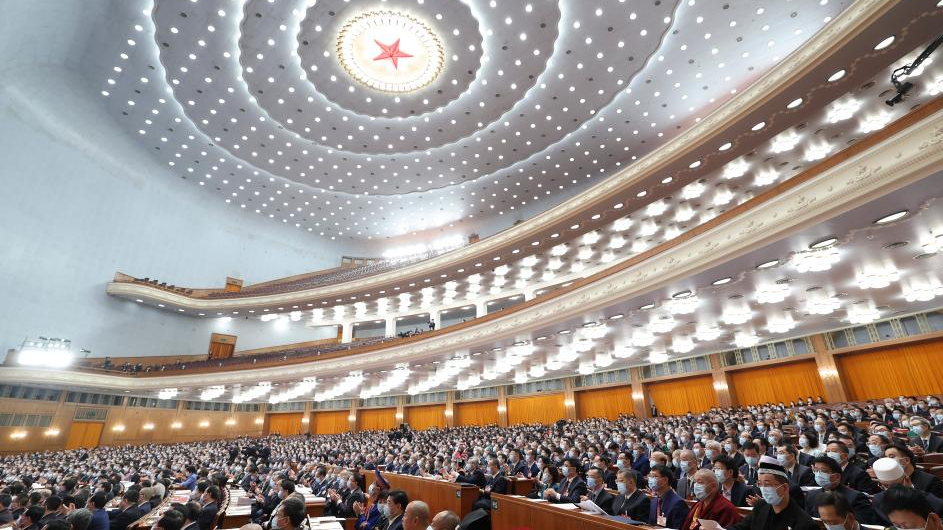
The second plenary meeting of the first session of the 14th National Committee of the Chinese People's Political Consultative Conference is held at the Great Hall of the People in Beijing, capital of China, March 7, 2023. /Xinhua
The second plenary meeting of the first session of the 14th National Committee of the Chinese People's Political Consultative Conference is held at the Great Hall of the People in Beijing, capital of China, March 7, 2023. /Xinhua
Editor's note: Yuan Sha is an assistant research fellow with Department for American Studies at China Institute of International Studies. The article reflects the author's opinions and not necessarily the views of CGTN.
As the first session of the 14th National Committee of the Chinese People's Political Consultative Conference (CPPCC) proceeds in Beijing, the planned deep institutional reform of the State Council has captured worldwide attention.
According to the draft amendment to China's Legislation Law that was deliberated on March 7, the focus is on: sci-tech, financial regulation, data management, rural rejuvenation, intellectual property protection and senior citizen caring, with the goal to achieve "more sound in institutional setup, more optimized in functional allocation, more refined in institutional mechanism, and more efficient in operational management." Given the imperative of national rejuvenation against a harsh international environment, the reform is a timely endeavor and would have tremendous implications for China and the world at large.
The reform would be the ninth such reform since China's reform and opening-up began over four decades ago. The overarching theme is optimizing government institutions and modernizing national governance to unleash China's socioeconomic potential to grasp the opportunities and meet the challenges of the time.
The previous eight reforms occurred during critical junctures along China's development path, and have played a pivotal role in boosting sustained growth and ensuring national progress. For example, the reform in 1982 is aimed at deepening economic restructuring from planned economy, and slashed State Council institutions from 100 to 61. The reform in 2013 centered on the function reform of government institutions. The last reform in 2018 has consolidated government bodies to 26 under the State Council. This year's reform proposed to downsize 5 percent of positions in all departments of the central state organs, aimed at streamlining government institutions and boosting efficiency.
The reform made sci-tech development a key priority. Sci-tech is the key to socioeconomic development in the future. Over the years, China has witnessed robust sci-tech development, as the Australian Strategic Policy Institute (ASPI) said in a recent report that China had a "stunning lead" in 37 of 44 critical and emerging technologies. Nonetheless, aimed at containing and suppressing China, the U.S. has strengthened export controls, tightened two-way investment screening, and dampened people-to-people exchanges in the sci-tech sector.

China's Five-hundred-meter Aperture Spherical Radio Telescope under maintenance in southwest China's Guizhou Province, July 21, 2022. /Xinhua
China's Five-hundred-meter Aperture Spherical Radio Telescope under maintenance in southwest China's Guizhou Province, July 21, 2022. /Xinhua
The restructuring of the Ministry of Science and Technology and establishment of Science and Technology Commission of the Communist Party of China (CPC) Central Committee is dedicated to the imperative of sci-tech development by coordinating the whole-process management of sci-tech innovation, pushing for breakthroughs in critical technologies and achieving greater self-reliance to protect China's national interest and safeguard national security. The plan also proposed upgrading China's intellectual property management to protect indigenous innovation and ensure a legal environment for sci-tech development.
The reform on the financial sector is also a watched across the world. Ever since the global financial crisis in 2008, financial risk management has been a major concern in the country and around the world. China's State Council set up the Financial Stability and Development Committee in 2017, and consolidated the Banking Regulatory Commission and Securities Regulatory Commission into one body in 2018.
Aimed at ensuring the stable and healthy development of the financial market, the State Council proposed to revamp the financial watchdog by setting up a National Financial Regulatory Management Administration directly under the State Council, tasked to strengthen risk management and protect financial consumers. The plan would also reform local financial regulatory bodies to mitigate grass-root level financial risks and build social resilience against financial shocks.
The reform also touches on other important sectors. Catering to the vibrant digital economy and the digital China, a National Data Bureau would be set up to unleash the great potential of data while overseeing data security, data privacy and data flow. Facing the prospect of demographic change, the government would invest more resources to upgrade the elderly-care work mechanism to deliver more tangible benefits to common people. In a push for rural revitalization, China would optimize the functions of the Ministry of Agriculture and Rural Affairs. To better meet people's needs, China would bring the Public Complaints and Proposals Administration directly under the State Council.
All in all, the reform would be a crucial step toward China's governance modernization and common prosperity endeavor. It would improve China's business environment and inject optimism to a robust global post-pandemic recovery.
(If you want to contribute and have specific expertise, please contact us at opinions@cgtn.com. Follow @thouse_opinions on Twitter to discover the latest commentaries in the CGTN Opinion Section.)